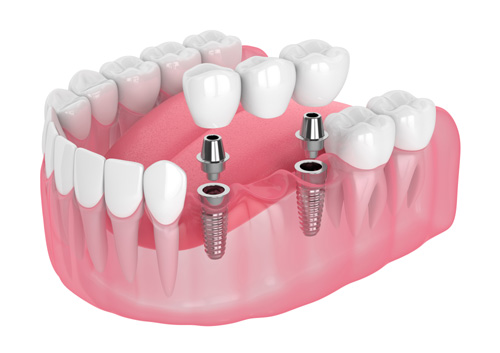Being in the market for an implant is not as straightforward as one may think. Depending on your circumstances, there are often a variety of options to choose from when it comes to finding the perfect tooth replacement for your specific mouth. When you are looking for a natural and comfortable replacement for missing teeth, an implant-supported bridge may come up. Unlike a traditional dental bridge, which relies on adjacent teeth for support, an implant-supported bridge is anchored directly into the jawbone.
An implant-supported bridge is a form of tooth replacement for those who are missing at least two neighboring teeth. Two implants will be placed directly into the jawbone. This process, known as implant placement, involves the surgical insertion of titanium implant screws into the jawbone and a healing process that includes healing caps and abutments. After this area has healed and abutments have been placed to directly connect the posts to the crowns, the custom-made dental crowns, matched to the shape and color of existing teeth, will be anchored in place. When you are considering a dental implant, it is imperative you consult a dedicated oral surgeon like one from Union City Oral Surgery Group prior to making any big decisions. We can help you review the pros and cons, and we will also devise a treatment plan catered to you.
Understanding Implant-Supported Bridges
Implant-supported bridges are a type of dental restoration that combines the benefits of dental implants and traditional bridges. They are designed to replace one or more missing teeth, restoring the natural appearance and function of the mouth.
Unlike traditional bridges, which rely on neighboring teeth for support, implant-supported bridges are anchored to dental implants, which are surgically placed in the jawbone. This provides a more stable and long-lasting solution for tooth replacement. By using dental implants, the bridge gains a secure foundation, ensuring that it remains firmly in place and functions just like natural teeth.
Advantages of an Implant-Supported Bridge
When compared to the plethora of other options available for tooth replacements, the implant-supported bridge offers many unique advantages over traditional bridges. For starters, it does not require the usage of natural teeth. Instead, by using dental implants, the patient can receive their bridge without the usage of their natural teeth.
Implant-supported dental bridges do not require the usage of natural teeth, which often have to be heavily shaved down in traditional bridges, making them a more conservative option. Traditional bridges rely on supporting teeth, which must be covered by crowns and have healthy gum and bone tissues to withstand chewing forces. In contrast, an implant bridge provides better stability and reduces reliance on natural teeth.
Once the implants have been placed and healed, the patient can fully expect to have a long-lasting and natural-looking addition to their mouth. Implant-supported bridges, if taken care of properly, can be permanent fixtures and can help fully restore the look, feel, and function of the missing teeth.
Dental Implants: The Foundation of Implant-Supported Bridges
Dental implants are the foundation of implant-supported bridges. These artificial tooth roots, typically made of titanium, are surgically placed in the jawbone to support a dental restoration.
Designed to mimic the natural tooth root, dental implants provide a stable base for the bridge. Each implant consists of three parts: the implant body, the abutment, and the crown. The implant body is the part that is surgically embedded in the jawbone, the abutment acts as a connector attaching the crown to the implant, and the crown is the visible part of the tooth. This structure ensures that the implant-supported bridge is both functional and aesthetically pleasing.
Types of Implant-Supported Bridges
There are several types of implant-supported bridges, each catering to different dental needs:
- Fixed Implant-Supported Bridges: These are the most common type and are permanently attached to the dental implants. They cannot be removed, offering a stable and durable solution.
- Removable Implant-Supported Bridges: These bridges are attached to the dental implants with clips or clasps, allowing them to be removed for cleaning and maintenance.
- Cantilever Implant-Supported Bridges: Used to replace a single tooth, these bridges are attached to a single dental implant.
- Full-Arch Implant-Supported Bridges: Designed to replace an entire arch of teeth, these bridges are anchored to multiple dental implants, providing comprehensive restoration.
Each type of implant-supported bridge offers unique benefits, making it essential to consult with a dental professional to determine the best option for your specific needs.
Comparison to Traditional Bridges
Implant-supported bridges have several advantages over traditional bridges. They are more stable and long-lasting, as they do not rely on neighboring teeth for support. This means that the adjacent teeth do not need to be filed down, preserving more of your natural tooth structure.
Additionally, implant-supported bridges provide a more natural appearance and feel, closely mimicking the look and function of natural teeth. They are also versatile, capable of replacing multiple teeth. However, it’s important to note that implant-supported bridges are more expensive than traditional bridges and require a surgical procedure for placement. Despite the higher cost, many patients find the benefits of stability, longevity, and preservation of healthy teeth to be well worth the investment.
Cost and Financing
The cost of implant-supported bridges varies depending on several factors, including the number of teeth being replaced, the type of bridge used, and the location of the dental practice. On average, the cost of a single implant-supported bridge can range from $2,000 to $5,000.
While this may seem high, financing options are available to help make the procedure more affordable. Many dental practices offer financing plans and payment options, and some insurance plans may cover part of the cost. It’s best to consult with a dental professional to determine the specific cost and financing options available for your needs. By exploring these options, you can find a solution that fits your budget while ensuring you receive the best possible care.
Who Makes a Good Candidate for Dental Implants and an Implant-Supported Bridge?
When you have your initial consultation with an oral surgeon at Union City Oral Surgery Group, they will conduct a full examination of your mouth. Depending on how you lost your missing tooth, you may need additional surgical procedures before you are a good candidate for the implant process. For example, if you had to have your teeth extracted due to a gum disease, like periodontitis, your oral surgeon may schedule you for a series of restorative visits. This would allow for your gum disease to heal and for your gums and jawbone to be healthy and sturdy enough to fully support the post of the dental implant.
Good candidates must have a jawbone healthy enough to take the stress of the post of the implant, as well as not have any active gum diseases or other oral health issues. Additionally, sufficient healthy teeth are needed to support traditional dental bridges, and the lack of healthy teeth can be a reason to opt for implant-supported bridges.
Tooth decay can also impact your eligibility for dental implant surgery, as it may require additional treatment before proceeding. Receiving implants can take a while to be installed, as every individual component must heal before the next is placed. Having a happy and healthy smile beforehand gives you the best possible shot at a straightforward procedure.
Consult Union City Oral Surgery Group: Find Your Best Options for Missing Teeth With a Professional Today
Partnering with an oral surgeon you can trust is pivotal to a painless, quick, and cost-effective experience. Dental implant-supported bridges, also known as implant bridges, are an excellent replacement treatment option for those missing multiple teeth, improving both oral health and the appearance of your smile. Implant bridges offer significant advantages over traditional solutions by effectively replacing multiple missing teeth without relying on natural teeth for support.
When you are considering an implant-supported bridge, look no further than the dedicated team of dental professionals at Union City Oral Surgery Group. The process of receiving a final dental bridge involves steps like impressions, manufacture of final abutments and ceramic dental bridges, and the cementation of the final bridge onto the abutments. With a team composed of highly educated oral and maxillofacial surgeons, our facility is able to offer minimally invasive surgical procedures conducted with only the newest and greatest technology available. Our people-first approach to the world of oral health means you will have access to a team of compassionate professionals that you can trust. To start the process today and see how we can best help your specific implant needs, please give our office a call at (201) 601-9262 or fill out our contact form.


